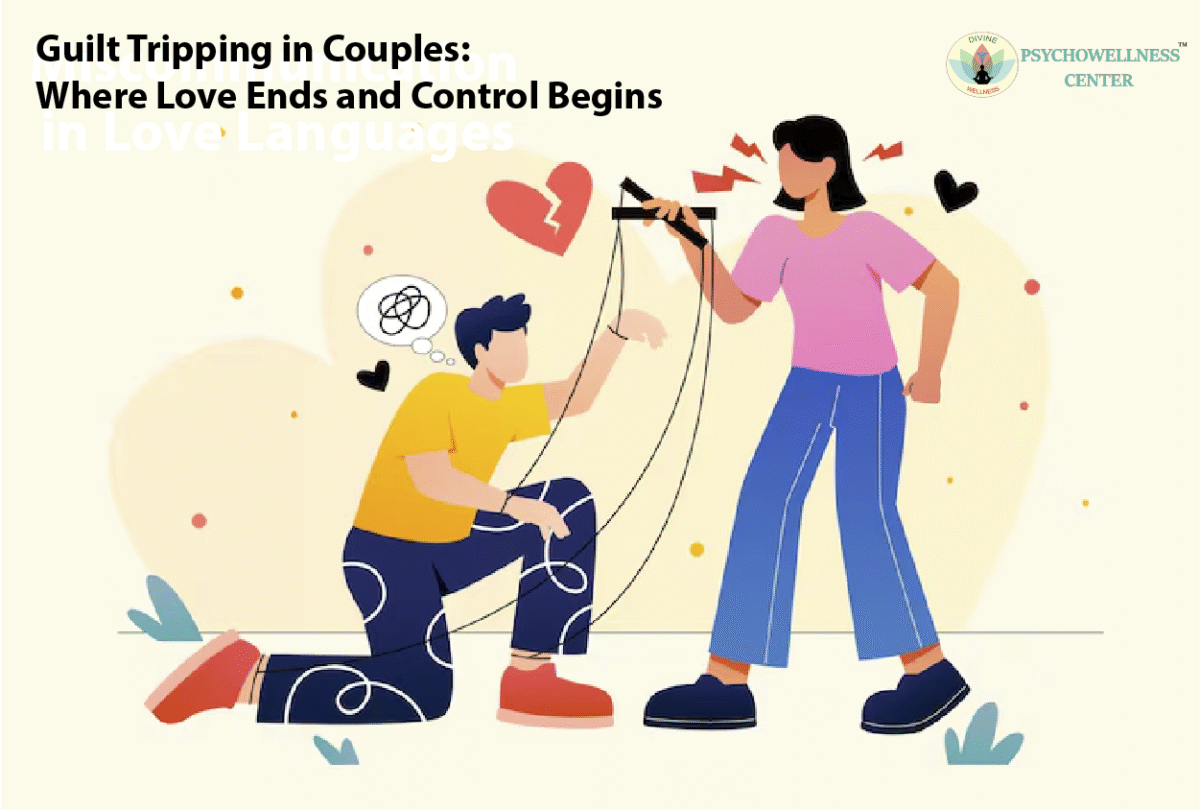Healthy relationships are built on a foundation of mutual respect, trust, and a sense of emotional security. When these foundations are strong, love grows freely. But sometimes, what starts as love and care slowly morphs into a power dynamic that suffocates one partner under the weight of emotional manipulation.
But at its core, it’s a control tactic that uses guilt to influence a partner’s behaviour. Over time, it erodes self-esteem, breeds resentment, and can lead to a toxic relationship dynamic. In this blog, we’ll explore what guilt tripping looks like in couples, how to identify it, why it’s harmful, and what can be done to heal or escape its grasp.
What is Guilt Tripping?
Guilt tripping is a technique where one person tries to make another feel guilty to influence their decisions or emotions. It’s often subtle and disguised as disappointment, emotional distress, or martyrdom.
- In romantic relationships, guilt tripping can sound like:
- “After everything I’ve done for you, you still won’t do this thing?”
- “You’re going out again? Wow, I’ll just sit here alone like always.”
While occasional expressions of hurt or frustration are normal, repeated use of guilt to get one’s way crosses a line from emotional honesty into emotional manipulation.
Guilt Tripping vs. Healthy Communication
It’s important to distinguish between guilt tripping and healthy emotional expression. For example, saying “I felt hurt when you cancelled our plans” is not guilt tripping. It’s an honest sharing of feelings. But saying “You don’t care about me at all since you cancelled our plans” is an attempt to make the other person feel guilty, often to regain control or superiority in the relationship. Guilt tripping, on the other hand, uses blame, shame, and exaggeration to emotionally manipulate.
Why People Use Guilt Tripping in Relationships
Guilt tripping often stems from insecurity, fear of abandonment, or unresolved emotional wounds. Sometimes, it is a learned behaviour from childhood — if someone grew up in a family where guilt was used as a control tactic, they might unknowingly replicate that dynamic in adult relationships. In other cases, guilt tripping is more calculated and intentional, used by partners who want control, compliance, or emotional dominance. In such cases, it can be part of a broader pattern of emotional abuse.
Signs You’re Being Guilt Tripped
You may find yourself constantly questioning your actions or feeling responsible for your partner’s happiness. Here are some signs you’re being guilt-tripped:
- Your partner makes you feel selfish for asserting your needs.
- You feel emotionally blackmailed into saying “yes.”
- You are frequently reminded of past mistakes to control your present behaviour.
If these experiences feel familiar, it may be time to take a step back and assess the health of your relationship.
The Impact of Guilt Tripping on Relationships
Guilt tripping may seem like a minor emotional tactic, but its effects can be deeply damaging over time. It erodes trust, stifles open communication, and often leads to resentment in the partner who is being manipulated.
Instead of acting out of love or mutual understanding, the guilt-tripped partner may comply out of fear, anxiety, or emotional exhaustion. This not only undermines personal boundaries but also disrupts the balance of power in the relationship.
According to research by Vangelisti & Young (2000), emotional manipulation, such as guilt tripping, often leads to emotional withdrawal, reduced relationship satisfaction, and increased couple conflict, ultimately weakening the bond between partners.
When Love Becomes Control
When guilt tripping becomes a pattern, it is no longer about love — it’s about control. The manipulator may not realise it, but they are replacing affection with coercion, turning shared intimacy into a battlefield of emotional power.
This shift is dangerous. It creates an environment where love feels conditional — “I’ll love you if you do what I want.” Over time, this dynamic can damage not only the relationship but also the emotional well-being of the partner being manipulated.
Breaking the Cycle
If you recognise guilt tripping in your relationship, it’s crucial to address it early. Here’s how to start:
- Acknowledge Pattern: Reflect honestly on whether guilt is being used by you or your partner as a tool to manipulate.
- Set Healthy Boundaries: Be clear about what is acceptable and what isn’t. Let your partner know you won’t accept being guilted into actions or decisions.
- Communicate Openly: Use non-blaming language to express how the guilt-tripping affects you. For example: “When you say things like that, I feel manipulated, and it makes it harder for me to be honest with you.”
- Seek Professional Help: Couples therapy can be extremely beneficial in uncovering the root causes of guilt tripping and helping both partners develop healthier ways of relating. Apps like TalktoAngel offer access to experienced relationship counsellors, and for offline professional help, visit the best relationship counsellor in Delhi at Psychowellness Centre.
- Know When to Walk Away: If the manipulative behaviour continues despite your efforts, it might be necessary to evaluate whether the relationship is emotionally safe for you.
Conclusion
Love should be liberating, not limiting. It should uplift, not undermine. Guilt tripping doesn’t strengthen love — it poisons it. Healthy relationships are built on mutual care, honest communication, and emotional respect. By identifying and addressing guilt tripping, couples can begin to rebuild trust, establish healthier boundaries, and rediscover a connection rooted in authenticity, not control.
Contributed by Ms. Tanu Sangwan, Counselling Psychologist
This blog was posted on 20th June 2025
References
- Vangelisti, A. L., & Young, S. L. (2000). When words hurt: The effects of perceived hurtful messages on relational satisfaction and closeness. Human Communication Research, 26(3), 370-419. https://doi.org/10.1111/j.1468-2958.2000.tb00762.x
- Sarkis, S. (2015). Gaslighting and manipulation in relationships. Psychology Today. https://www.psychologytoday.com/us/blog
- Gottman, J. M., & Silver, N. (2015). The Seven Principles for Making Marriage Work. Harmony Books.
- Forward, S. (1997). Emotional Blackmail: When the People in Your Life Use Fear, Obligation, and Guilt to Manipulate You. Harper Perennial.
- American Psychological Association. (2021). Recognizing emotional abuse. https://www.apa.org/topics/abuse/emotional

